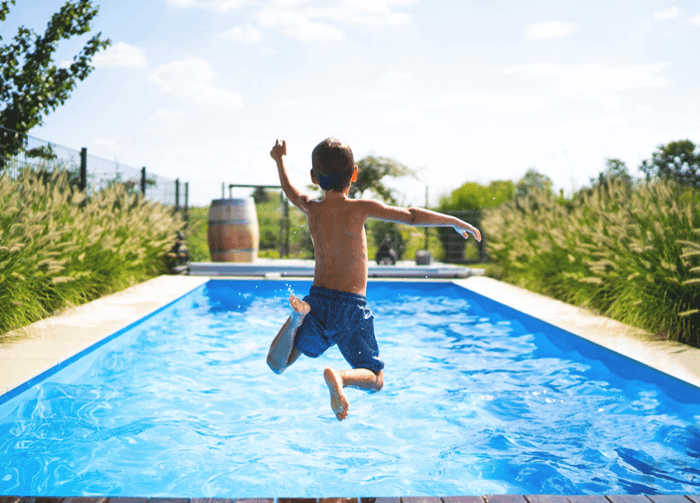Whenever there is talk of a saltwater pool, I consider physical issues. To understand its benefits, you must know about the harmful effects of chlorinated pools.
Many of my clients say that they lost a lot of hair and hair after swimming in the chlorinator pool. But the experience changed when I swam in the saltwater pool. That pool is much safer and healthier. Algae and bacteria are associated with a swimming pool pond. Saltwater pools kill harmful bacteria. It occurs in a particular process, which causes the bacteria to evaporate. So we can say that saltwater pool is capable of destroying bacteria.
As you wish, the pool water has less effect on your body. So a saltwater pool converted to saline with salt rather than chlorine water would be perfect for you. The water in this pool will stay soft even after you swim for a long time and will not cause eye damage. There is only one reason for this: salt is added to the pool water, so there is very little toxin in that water. Knowledge of saltwater pools and chlorinated pools is essential to get a clear idea of this. I am going to start a detailed discussion about safe saltwater pool with you step by step.
Contents
Saltwater pool vs. Chlorinated Pool
A saltwater pool gets cleaned employing a filtering system called a salt-chlorine generator. The system uses electricity to show salt into Chlorine, which cleans the pool.
A saltwater pool makes use of dissolved salt rather than chlorine tablets for cleansing and sanitizing the water. The chlorinator unit uses electrolysis to interrupt the salt and water regularly. The quantity of salt you’ll increase your pool hebdomadally or monthly will depend upon the amount of backwashing you are doing on your pool, the amount of rain, and therefore the water lost thanks to draining and splashing.
Saltwater pools require less maintenance and are less costly. You’ll have less time to spend balancing the pH levels and ensuring that the chemicals within the water are balanced. Typically, during summer, you’ll expect to pay from $20 to $30 for the whole season.
Saltwater pools won’t leave you feeling like you just got off the ocean, and therefore the water isn’t as salty, just like the sea. This technique is supposed to offer you the advantages of a chlorine-based system pool minus the massive amounts of harmful chemicals. During a saltwater pool, the water feels smoother and more refreshing to the skin and cannot leave it dry or covered in whitish flaking on your skin.
Does the household chlorine smell kill bacteria?
Household bleach is made by mixing sodium hydroxide with water. Chlorine gas is pumping through this solution, and therefore the resulting reaction creates hypochlorite. The ultimate mixture features a hypochlorite concentration of up to six. Over the previous couple of years, some bleach manufacturers have designed products with higher concentrations of hypochlorite. The EPA reported that to possess effective germicidal kill claims for C. diff., a bacterium always spreads in hospitals and nursing facilities.
The smell of bleach chemical in itself shouldn’t be the attention of concern when utilized under labeling directions. When using that type of bleach, the smell is more noticeable when breaking down proteins that structure pathogens. Therefore, the more frequent the pool cleaning process, the less perceptible the odor. When the cleaning process is complete, bleach breaks down into 95% or more water and salt. There’s a misperception by some folks that bleach contains free-standing Chlorine, which is harmful to the physical body.
That is often not true. Like all chemical reactions, the resulting product is entirely different than the first components. Like all cleaning chemicals with odor, bleach fumes are often vented by opening windows and doors or having running ventilation. Unfortunately, some people exhibit adverse responses to strong fragrances, albeit the airborne concentration doesn’t meet the EPA defined levels for irritation. During a commercial cleaning environment where hundreds or thousands of individuals may walk into the power on a given day, the danger of exposure to an individual with high sensitivity increases dramatically.
Bleach isn’t a horrible product, but it’s also not the most straightforward solution in every application. Not every surface needs disinfection, and if bleach is employed. It is often significant overkill when a general-purpose cleaner could also be a far better option. In other applications like surfaces that contact food, the perfect cleaning treatment may be a food-surface sanitizer. As bleach is an aggressive whitener, if it’s spilled on clothing or certain surfaces, it’ll damage the material or the surface.
Therefore, recommendations for bleach applications involve applying the bleach to a cloth, towel, or wiper and indirectly to any surface. It’s always important to properly handle bleach and each other cleaning chemical, for that matter.
Does a saltwater pool kill the bacteria as effectively as a chlorine pool?
The deficient level of salt (NaCl) within the water is for the “salt cell” to supply Chlorine, and therefore, the salt level is bare, if ever, perceptible by the swimmer.
Saltwater pools require less maintenance (just inexpensive bags of salt) without the necessity for expensive chlorine tablets; however, the salt cell’s initial capital costs are costly. Saltwater pools’ water quality is considerably above a chlorine pool because the water is a smaller amount harsh on the skin and hair and swimming clothing. The water of a saltwater pool is silky smooth compared to a chlorine pool.
Over the future, either system’s value is probably going an equivalent with less hand on maintenance with a saltwater pool than the constant purchase and adding of chlorine tablets. Both pool types are perfectly safe from microbes because they will have an equivalent amount of Chlorine within the water when adequately maintained.
Can you pee in a saltwater swimming pool?
A recent survey completed by the Water Quality and Health Council uncovered an entire host of disturbing statistics about American pool habits. Also including the fact that 20 percent of yank adults say they do not leave the water once they get to urinate — and people are just the people that admit to that.
A saltwater pool – that’s not crammed with ocean water. Uses a chlorine generator that breaks down salt (NaCl) within the pool into Sodium (Na) and Chloride (Cl) – or Chlorine.
Urine, however, is usually non-organic. Chlorine attacks organic material, not inorganic material. So, the urine remains within the pool no matter the sort of pool it’s.
The Chlorine during a pool reacts with the acid in your urine and turns into cyanogen chloride. If enough people peed in your pool to displace 1/3 of the water within the pool, it might become a toxic soup healthy enough to harm you significantly. However, pools rarely have quite about 12 parts per billion of cyanogen chloride in them – not nearly on the brink of the 2500ppb required to melt the skin off your bones. The beverage is allowed to possess up to 70ppb cyanogen chloride.
Chlorine and acid combine to supply trichloramine – the chemical which will cause lung irritation and what you always smell during a pool that hasn’t been appropriately shocked and smells like an excessive amount of Chlorine. If the pool has enough trichloramine, it can irritate your lungs and cause people with asthma to possess breathing problems.
I would worry more about the fecal content in pools and other bacteria/parasites like cryptosporidium in pool water. Don’t drink pool water – it’s a bunch of pee, spit, fecal matter, skin cells, sweat, and Chlorine in it!
Know More:
How to Open an Above Ground Pool in 11 Steps
What Happens If You Swim in a Shocked Pool?
Leaf Canister for Pool Vacuum
Is a Salt Water Pool Good for my Family Health?
Chlorine kills bacteria through a comparatively simple reaction. In the chlorine solution, you can increase the pool water breaks down. Into many various chemicals by including hypochlorous acid(HOCl) and hypochlorite ion (OCl-). Both can kill microorganisms and bacteria by attacking the cell walls’ lipids and destroying the cell’s enzymes and structures, rendering them oxidized and harmless. In the effort to kill bacteria using Chlorine in pools, health concerns like gasses are inhaled and, therefore, the damage it does to skin, hair, and eyes.
Many people do not know the physical body has 0.15 percent chlorine by weight, but overexposure is toxic.
There is a small misconception about salt water pool systems: they are doing have Chlorine. Chlorine you buy to feature to your pool is way more concentrated and chemically produced through various methods. It’s harsher than the Chlorine produced by a saltwater generator. Ever notice when swimming during a public pool the stringent chemical smell on your skin lingers on long after leaving the pool? That’s thanks to higher levels of Chlorine also as other components from the chloramines that produced.
One of the right reasons I chose a saltwater pool system for my pool is that the salt generated Chlorine is such a lot milder. The initial salt added to the pool’s water was food-grade salt (pickling salt) and wasn’t harsh on my child’s eyes and skin. When swimming within the pool, one can barely detect any salt within the water in the least, and you can’t see any chlorine within the water by taste or smell. Swimming in an all chemically-produced chlorine pool, we begin smelling of Chlorine, burning red eyes and skin irritation, and having to shower to urge the smell off.
Counting on what system you’ve got, you’ll still need to add other products for pH balancing. Because salt doesn’t evaporate, you are doing not need to add salt, unlike Chlorine continuously. The saltwater generator continually uses the salt within the pool and electrically turns it into Chlorine. Cutting the value to you and impact on the environment from packaging materials from buying chemically-produced Chlorine.
Conclusion
Just as chlorine deficiency poisons pool water, the poisoning begins when excess Chlorine is added to the pool. But such harmful effects are not observed in saline pools. Since the salts are stirred by electrical analysis, it is naturally converted into a chlorine pool. Over-exposure to this process can eliminate other parasites, including toxic bacteria, from the saltwater pool. So you can prepare the saltwater pool in the right way; however, you will get a bacteria-free pool. It would be best things if you had a saltwater pool to enjoy your fun swimming moments.

